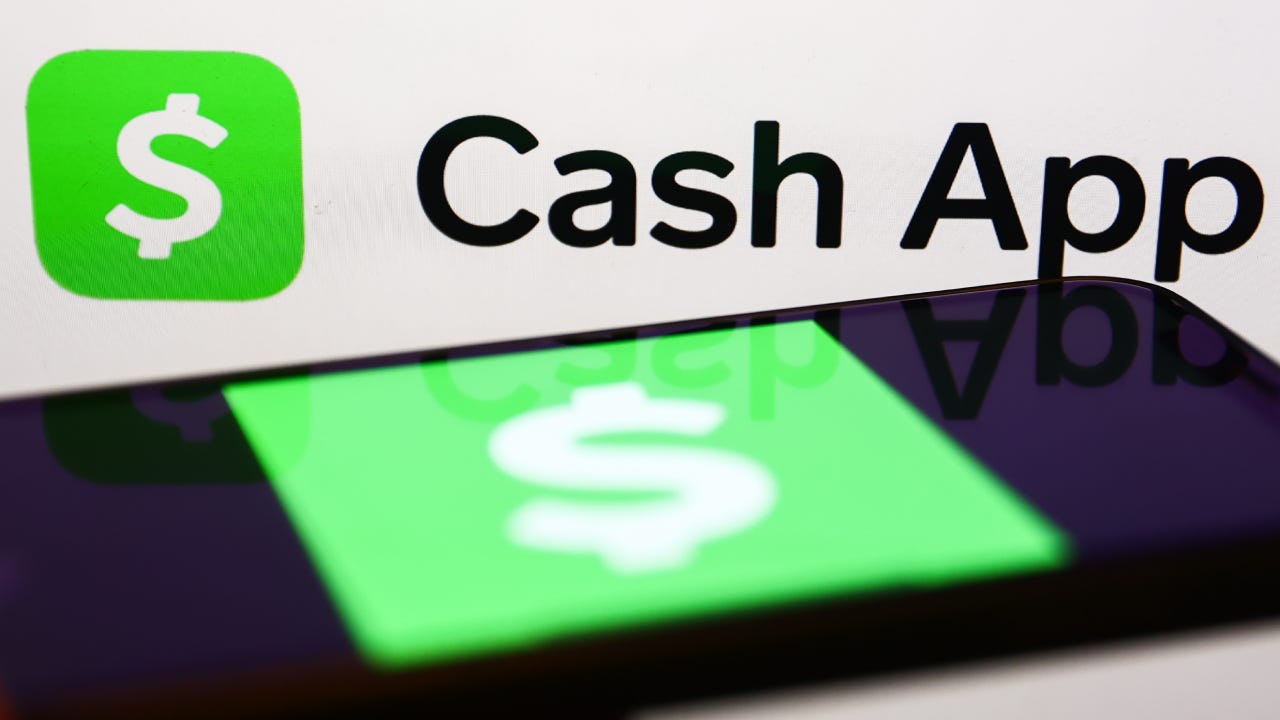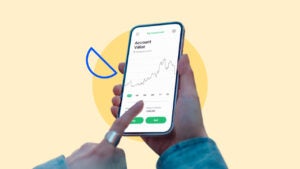Cash App Investing review 2025




Cash App incorporates banking, spending and investing all into a single streamlined app. The banking side includes a debit card and early access to your paycheck when you set up direct deposit. Swipe over to the investing side and you can invest with just $1 in your account. You can buy stocks and exchange-traded funds (ETFs) commission-free. Cash App even allows customers to buy, sell or transfer Bitcoin, though there are fees associated with that.
Cash App Investing likely won’t meet the demands of experienced investors or frequent traders, but its simplicity may appeal to those just starting out.
Those looking for a deeper investment offering within an app should consider Robinhood or Webull, where you can trade more securities and cryptocurrencies. If you’re looking for a robo-advisor to build a portfolio for you along with a solid cash management account, Betterment is one to consider.
Best for
- Beginning investors
- Mobile banking users
- Cost-conscious investors
Cash App Investing at a glance
| Category | Cash App |
|---|---|
| Account minimum | $1 to start investing, otherwise no minimum |
| Securities tradable | More than 1,800 stocks and ETFs; Bitcoin |
| Account types | Individual taxable |
| Cash management account | Debit card, 2-day early direct deposit, Cash Boost discounts on card purchases, ATM access: $2.50 fee for Cash Card withdrawals, but all fees can be waived with direct deposits totaling at least $300 each month |
| Tools | Basic charts, basic watchlists, news feed and company profile |
| Customer service | FAQ, chat, and phone Monday-Friday 9 a.m.-7 p.m. ET |
| Promotion | Referral bonus if friends sign up |
Pros: Where Cash App Investing stands out
Easy to sign up and use
Cash App is so easy to sign up for that you’ll be in your account before you even realize you have one. Provide your name, add either an email or phone number, pick your username (your cashtag, as it’s called) and you’re ready to roll. Your cashtag acts as an identifier when you want to move money peer to peer.
There are several ways to start moving money in and out of the account. You can link your bank account and transfer money in, set up a direct deposit or download the app and request money from someone.
A few buttons in the easy-to-navigate app let you move between the various functions: money transfer, a bank account with debit card, an investing account, an overview of your finances at Cash App and a referral tab that allows you to invite friends and pick up a promotion for those who do sign up, fund an account and send cash.
The app couldn’t be easier to use — and that can be a pro and a con: It’s so stripped-down that you’ll know exactly what to do as soon as you download and open the app, yet the design doesn’t accommodate more advanced functionality for complex things such as investing. Still, the app strikes a good balance, especially for beginners, without being too restrictive.
Low costs and account minimum
Cash App has no account minimum and requires just one dollar to trade stocks. You don’t have to worry about coming up with enough money to afford an entire share of stock, either.
When you invest using Cash App you’re buying fractional shares — a small slice of a company stock or ETF. So you’ll be able to put your whole investment to work immediately. Stock and ETF trading doesn’t cost you any fees, in line with the industry’s shift to no commission, though Bitcoin trading through Cash App will cost you extra, as explained below.
On the cash management side, Cash App is like a PayPal or Venmo account with some added features. And unlike a rival such as Acorns, which also enables investing small amounts, you won’t have to pay a monthly fee to access features, though you won’t get that app’s range of features either.
Access to a range of stocks and ETFs
Cash App Investing provides access to more than 1,800 stocks and ETFs on its platform — a broad enough range for most investors. The stock lineup consists of companies that have a market capitalization of more than $300 million and are listed on the New York Stock Exchange or Nasdaq, as well as a few other criteria.
Cash App Investing also offers ETFs, and you can quickly find what’s available here by clicking on a search tab within the investing function. The lineup includes ETFs from some of the top fund companies, including Vanguard and iShares. The most popular index funds are represented, too, so you’ll have access to top funds based on the Standard & Poor’s 500 Index and the Nasdaq 100, for example, as well as many other potential high performers.
Cash management account
The cash management account offers many of the core banking functions, with the ability to send and receive money. You can have a paycheck direct-deposited up to two days early, and you can get a debit card that offers some spending rewards – or “boosts” as the company calls them. Again, it’s core functions here, not the whole range of perks with other top cash management accounts.
As for ATM access, Cash App will charge you $2.50 on its end for each transaction, though if you’ve direct-deposited at least $300 each month, it reimburses all fees, including operator fees.
If you have a Cash Card from Cash App, then your money is protected by FDIC insurance through the app’s partner banks. That provides coverage up to $250,000 per depositor, a level of protection that puts it in line with other cash management accounts.
Cash App can also act as a Bitcoin wallet by allowing you to buy, sell, store, transfer and send in Bitcoin as well as in dollars. You can also earn your spending rewards in Bitcoin if you want. If crypto is your thing, here’s a way and place to use it.
Access to Bitcoin
One of the draws for traders here is the ability to trade in Bitcoin. Cash App says that it “may” charge a fee when you buy and sell, and by that, it means Cash App “will” charge a fee. But just how much?
The app charges a basic service fee for each transaction (a percentage based on the total exchange amount) and another fee if you want a faster transfer (e.g., within minutes or hours). The standard speed (usually made within 24 hours) does not cost extra, while the cost of rush and priority speeds depends on the congestion of the blockchain network when you place the order.
Also worth noting here is that Cash App will provide you with the appropriate tax forms if you trade or spend in Bitcoin. That’s critical, because you’ll need to report transactions on your annual return in order to avoid running afoul of IRS laws. However, determining the basis for your transactions is up to you, says Cash App, so you’ll need to refer to your transactions data.
Automatic investing
If you’re looking to automatically invest in Bitcoin or a specific stock or ETF, Cash App Investing allows you to set up a regular buying schedule, so you can set it and forget it with your stock purchases. You can set the app to buy daily, weekly or biweekly and then it executes your trade.
It’s a cool feature that you might not expect from such a stripped-down app. Regularly investing — or dollar-cost averaging — is the kind of good discipline required to succeed in growing your portfolio.
Customer support
When you’re dealing with a no-frills provider like Cash App, don’t come to the table expecting the kind of service offered by brokers like Charles Schwab or Fidelity. Still, Cash App has improved its customer support options in recent years.
The app offers a workable support section on its website, so you can get answers to basic questions. You’ll also have the ability to contact support through chat and you can even make contact through the phone during somewhat-extended hours.
This approach is in line with other app-based rivals such as Robinhood and Webull, both of which have expanded their support capabilities in recent times.
Cons: Where Cash App Investing could improve
Limited stock and ETF selection
Even though Cash App Investing offers nearly 2,000 investments, if you’re expecting to buy deep-in-the-weeds stocks (as at other major brokers), you’re not likely to find what you’re looking for. Same with ETFs. Cash App’s offering is good within its bounds, but may not have that off-the-beaten-path thing you want.
Basic charting and features
Cash App offers a bare-bones setup if you’re clicking onto a stock to see more. For example, the charts provide just basic functionality — as in they don’t even feature numbers and axes, just a line noting where the stock has gone over a few preset time frames. Even Robinhood and Webull — which are considered stripped-down investment apps — offer more expansive trading capabilities, as well as solid cash management accounts.
It’s similar with the rest of the elements in the investing tab. The main tab offers a few preselected watchlists, such as the most-traded stocks or biggest movers, or you can create your own. If you’re looking for a stock by industry, a quick search tab allows you to pull up all the stocks on offer there. And that’s about the extent of the tools here.
Lack of cryptocurrencies
If you’re looking to trade cryptocurrencies, you should be aware that Cash App Investing only offers Bitcoin. Admittedly, it’s the largest and most popular name in the space, but even a few other crypto coins, such as Ethereum, could make the app more competitive with its rivals.
Interactive Brokers offers a handful of additional crypto options, as do Webull and Robinhood.
Why we ask for feedback Your feedback helps us improve our content and services. It takes less than a minute to complete.
Your responses are anonymous and will only be used for improving our website.
You may also like

The best cash back apps of 2025




